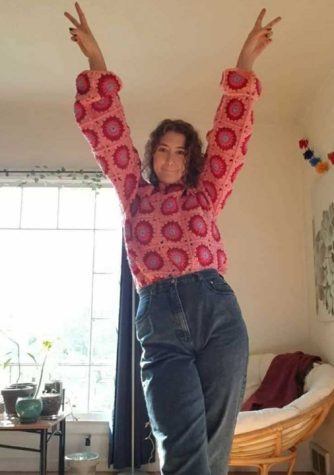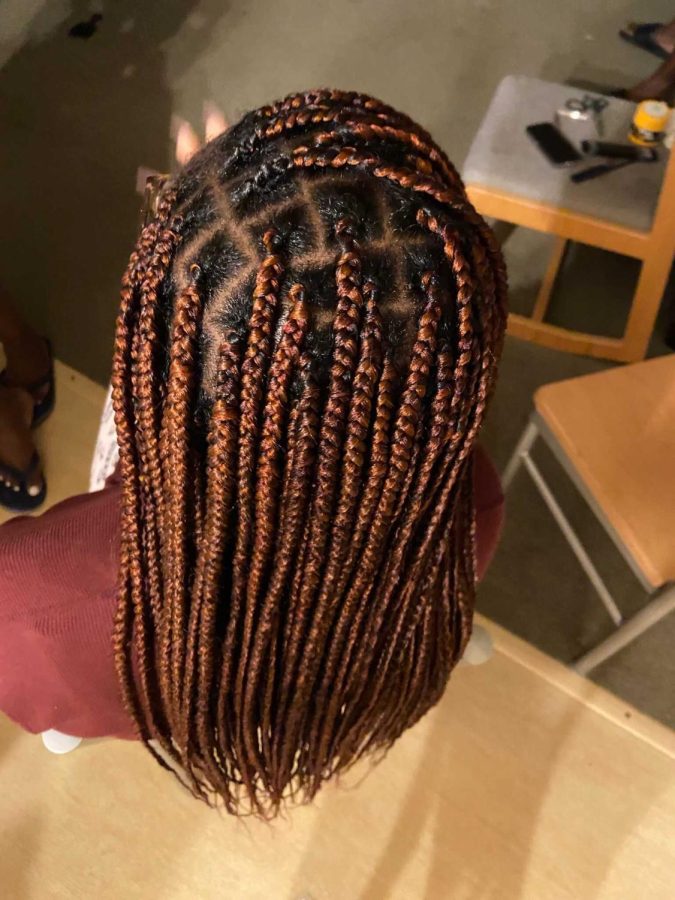It’s all in the hands: Calvin students demonstrate a diverse range of fashion skills
After six hours of work, Danquah’s work on her client is done.

It goes without saying that a lot of Calvin students are talented. But while talents like sports and dance receive due recognition, students with less publicly visible talents, like hair and fashion, often remain unacknowledged. But these talents are no less impressive or essential to the enrichment of student life. From the intimate details of mending to the intricacies of braiding hair, to the immersion of theater costuming, Calvin students keep fashion alive on campus in ways we may not always realize that we’re seeing.
Bobby pins, curlers and a whole lotta hair spray
Being a part of Calvin’s Theater Company has been one of the greatest highlights of Molly Fiske’s time at Calvin. Her position on the CTC costume and design crew serves as the perfect way for her to remain engaged in theater and feed her creative drive even while dealing with the course load of a biochemistry major on a pharmacy track, something she had feared she wouldn’t be able to after graduating high school.
“[Theater] is something that I know shapes me,” said Fiske, “and I needed something to be consistent because I kind of made a big transition going to college. I wanted something that I knew I could always fall back into.”
As a member of the costume crew, Fiske executes a variety of tasks. Depending on the production, the task at hand could be to age actors, to recreate a period look or to slap mud on actors who are clearly in discomfort but are also professionally committed to their craft. Fiske also tackles hair work, including “wigs, curlers, pins and a good amount of hairspray.”
I wanted something that I knew I could always fall back into.
“Everything’s harsher for the stage,” said Fiske. “So when it looks overdone to you without stage lights on you, you know you’ve done it right.”
According to Fiske, the bulk of her role as costume crew lies in mastering the techniques needed to recreate the stunning character visions of Costume Shop Manager Nancie Smith.
While it hasn’t always been a smooth road navigating her academic and CTC responsibilities, the community she has found in her time at CTC has been well worth it.
Now in her final semester, Fiske is faced with the bittersweet feeling of this possibly being the last time she finds herself participating in theater.
“I kind of knew that,” Fiske said. “That’s why I’ve tried to, like, help out with every show with hair and makeup just because I love live theater and I love helping out with it.”
All the twists
Senior Nuella Danquah’s hair braiding skills have made her a go-to for many African girls on campus.
Coming from Accra, Ghana, where Black hair was the sole market, the shortage of Black hair salons in Grand Rapids and America, in general, was the peak of culture shock for Danquah. For the first time in her life, she had to handle making her own hair. But ten years spent working in her sister’s salon had granted Nuella her own level of expertise and so she was more than equal to the task of fending for her hair.
Fast forward four years later, and many Africans don’t have to step off campus to get their hair done like she did. Danquah is one of a few who provide that service right at Calvin. Senegalese twists, rope twists, passion twists, box braids, knotless braids, name it, she does it. She braids students twice each month, and even more frequently during the summer.
Danquah takes cultural pride in her braiding craft: “I think it’s kind of symbolic of who we are as Africans, whether you’re African-American or strictly African.”
Danquah also practices hair therapy, curating lists of nourishing products and developing treatment strategies for black hair.
Seeing how people are sensitive about how their hair makes them look and being able to contribute to them feeling better about themselves … being able to do that actually fulfills me.
“It can go deeper than it just being hair,” Danquah said. “Somebody’s self-esteem depends on her hair.”
These are the victories that Danquah finds to be her greatest accomplishments.
“Seeing how people are sensitive about how their hair makes them look and being able to contribute to them feeling better about themselves … being able to do that actually fulfills me.”
Her experience doing hair at Calvin has reaffirmed her passion for skilled work, which she still hopes to pursue in the future.
Being fashionably conscious
In a world where many overlook the degrading effects of fast fashion on the environment, senior Eva Heetabrij uses fashion handiwork to implement sustainable clothing choices in her wardrobe. From clothing repair to fiber arts, Heetabrij stitches towards a safer future and looks good while doing it.
Heetabrij had her work cut out for her when she volunteered to teach a mending class during her term as sustainability coordinator without knowing how to sew herself. But the same passion for sustainability that had inspired the decision wouldn’t let her give up.
Determined to not only learn, but teach other students, she placed herself on an accelerated learning track, with the help of her mother, grandmother and a group of older ladies that met at Eldersveld lobby. She learned mending and knitting in time to teach the class with her mother and grandmother by her side. The three saw success with their class sessions, but even more important for Heetabrij was the discovery of what became an irreplaceable fashion tool for her closet.
According to Heetabrij, she has enjoyed countless fashion benefits of incorporating her own handiwork into her wardrobe. For one thing, she no longer has to part with her favorite sweaters or pants when they rip. In fact, using invisible mending or embroidery turns these beloved clothes into more loveable pieces. She’s also noticed that the clothes she knits or crochets are extremely durable, and she can customize each to her size and mood at the time of the making.
In describing the pieces she knits, she said, “It’s like a weird little time capsule of who you are at the moment.”
For Heetabrij, the benefits also exceed aesthetics. She considers fiber arts a huge form of stress relief. During the pandemic, knitting was a major coping mechanism for her.
It’s like a weird little time capsule of who you are at the moment.
“It was just such a blessing … because it kind of took my mind off of everything that was happening and I was just able to very meditatively do emotions,” she said.
Heetabrij also believes that practicing fiber arts has helped inspire her self-growth and acceptance.
“It was a healthy thing for me to start learning because it forced me to be okay with making mistakes and be okay with fixing them.” According to her, the essence of fiber arts is that it’s a skill and so one only gets better with practice.
Discovering a sense of connection and community was another plus that Heetabrij hadn’t expected, but one she greatly appreciates. She found particular solace in taking part in the historic practice of fashion hand work within her family. Heetabrij considers it a heritage that allows her to connect with the older women in her family on a new level.
As a science major, Heetabrij hadn’t considered herself creative. But learning clothing repair and fiber arts taught her newfound gratitude for her hands.
“I really don’t have an opportunity to express creativity that often. And so this has been just a great outlet for that kind of creative drive.”
Looking back, Heetabrij said she couldn’t imagine coping without it.



